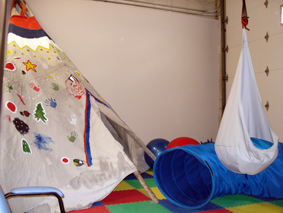The Ranch Ehrlo Learning Centre is celebrating five years of commitment and support to persons with developmental disabilities.
 The adult-based learning program is designed to support participants with developmental disabilities by providing community-based services and life skills education. Ranch Ehrlo participants and day students (referred by the public and catholic school systems) are challenged to achieve their full potential for independence, productivity, right to enjoy life, and inclusion in the community. Functional life skills, social skills, cultural involvement, and pre-vocational training are the program’s main areas of concentration for participants 17 years and older.
The adult-based learning program is designed to support participants with developmental disabilities by providing community-based services and life skills education. Ranch Ehrlo participants and day students (referred by the public and catholic school systems) are challenged to achieve their full potential for independence, productivity, right to enjoy life, and inclusion in the community. Functional life skills, social skills, cultural involvement, and pre-vocational training are the program’s main areas of concentration for participants 17 years and older.
“All of our participants are long-term. They may be here for the rest of their lives,” said Victoria Reiman, program manager. “A lot of them don’t have family or community involvement, so we are their family and their community.”
Learning Centre participants live with complex needs, and often have more than one diagnosis (Fetal Alcohol Syndrome Disorder, Autism, cognitive impairment, mental health issues etc.). The majority of students at the Learning Centre are non-verbal and are therefore highly unpredictable and aggressive, Reiman explained.
A two youth-to-one staff ratio ensures therapeutic support workers can adequately meet the needs of participants.
“Our staff here are tremendous…they are so calm, dignified, and professional,” Reiman said from the Learning Centre. “The staff is consistent and stable so when they come to work every day they know who they’re working with – that’s quite significant. The relationships the staff have with these participants are quite strong.”
As the day wrapped up and staff filtered out of the building, each met Victoria with a smile and story of their day. The expressions on their faces said nearly as much as their words.
One staff shared stories from a trip to the spray park and another said a tired student curled up and napped next to her as she completed reports; others enjoyed an afternoon movie, while some cut grass at the homes of their Ranch Ehrlo neighbours.
It’s clear that compassion is at the heart of this operation.
“The difference with Ranch Ehrlo staff is that they have the training, they have the support and they see the bigger picture,” said Reiman.
The Learning Centre is an extremely valuable resource to adults living with developmental disabilities, she said, adding demographics are changing and there’s been increasing demand for the program. The Learning Centre has capped its attendance at 14 participants, however 15 are currently enrolled in the program.
Participants attend the Learning Centre every day from 9 a.m. until 3 p.m. Students begin their day with life skills training and daily tasks which may include putting away dishes, doing laundry, wiping down light switches, or other household chores. After their tasks are completed, participants go into the community to pick up recycling from 35 locations throughout the city. After lunch, students participate in a community-based outing which could include a trip to the mall or library, or an outing to the park or gymnastics class.
Reiman said community integration is an integral part of the Learning Centre’s mandate, as the program strives to develop relationships and improve quality of life for people with developmental  disabilities.
disabilities.
“All of our outings, jobs, and recreational activities are community-based and they’re community based on purpose. (Participants) gain the right to access. They gain the ability to be with people they trust in an environment that might be somewhat confusing to them. They can now access places that they may not have been able to access before because of their behaviours,” she said.
“They don’t necessarily understand the world in the way you and I do; with rights and wrongs, good and bad so the only thing we can do is support them when they’re out in their community…and ensure it leaves them with a good feeling.”
For more information about educational programs for people with developmental disabilities contact Vice-President of Education, Corinna Hayden-Fidler (306) 781-1250.


